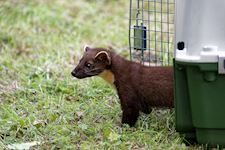Wildlife Rehabilitation Diploma Course
10 Modules | Lifetime Access | Study Group Access
Centre of Excellence
Summary
- Certificate of completion - Free
- Exam(s) / assessment(s) is included in price
- TOTUM card available but not included in price What's this?
Add to basket or enquire
Overview
Discover all aspects of the rehabilitation process of rescued wild animals, from clinical examination, assessment and recovery of health and wellbeing, to release. This course walks you through the concept of wildlife rehabilitation, the assessment of wild animals, common diseases found in wildlife, the importance of animal evaluation prior to rehabilitation and release, and the advancements and challenges of wildlife rehabilitation.
Achievement
CPD
Course media
Description
This course first covers the fundamentals of wildlife rehabilitation, including its main objectives, short- and long-term goals, and the role of wildlife rehabilitators. We’ll also look at the main types of rehabilitation and the stages a rescued animal will go through.
We’ll learn to recognise the causes, triggers and responses to stress, fear, and shock in animals, how to assess animal welfare, and the main rules and procedures followed when examining wildlife. You’ll also be guided through techniques for handling animals according to their taxonomic group and the risks that need to be considered. The course covers the main diseases that can present in rescued animals, including a thorough explanation of their definitions, causes, symptoms and treatments (when applicable).
We’ll examine the importance of evaluating animals prior to rehabilitation and their release into the wild, including a look at the measures, procedures, and regulations followed. The course also explores the link between conservation and animal welfare and provides case studies that demonstrate how conservation welfare can lead to successful reintroduction into the wild.
Finally, we’ll look into the main advancements and challenges of wildlife rehabilitation.
By studying this course, you will:
- Understand the concept, types and stages of wildlife rehabilitation
- Learn how animal wellbeing is assessed
- Become familiar with the common diseases found in wildlife
- Understand the importance of evaluating animals prior to rehabilitation and release
- Become familiar with the advancements and challenges of wildlife rehabilitation
Who is this course for?
If you are considering a career in wildlife rehabilitation specifically or animal welfare in general, the Wildlife Rehabilitation Diploma Course will give you a good foundational knowledge from which to build with further study and qualifications.
Animal lovers who’d like to gain a better understanding of the process of how wild animals are assessed, treated, rehabilitated, and successfully able to be reintroduced into the wild will also gain a lot from this course.
Requirements
There are no prerequisites, just an eagerness to learn and an internet connection.
Questions and answers
Currently there are no Q&As for this course. Be the first to ask a question.
Certificates
Certificate of completion
Digital certificate - Included
Reviews
Currently there are no reviews for this course. Be the first to leave a review.
Legal information
This course is advertised on reed.co.uk by the Course Provider, whose terms and conditions apply. Purchases are made directly from the Course Provider, and as such, content and materials are supplied by the Course Provider directly. Reed is acting as agent and not reseller in relation to this course. Reed's only responsibility is to facilitate your payment for the course. It is your responsibility to review and agree to the Course Provider's terms and conditions and satisfy yourself as to the suitability of the course you intend to purchase. Reed will not have any responsibility for the content of the course and/or associated materials.





